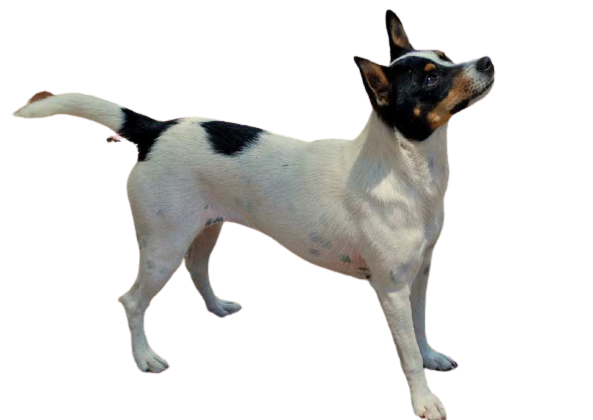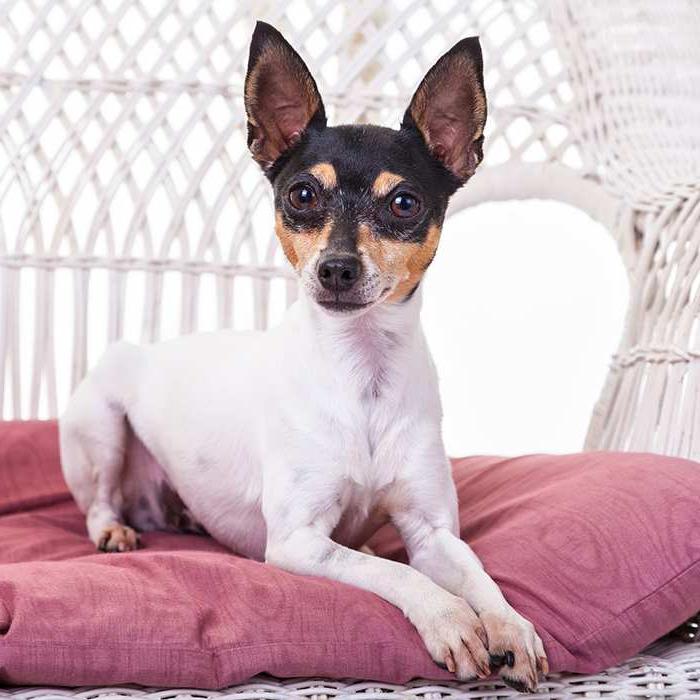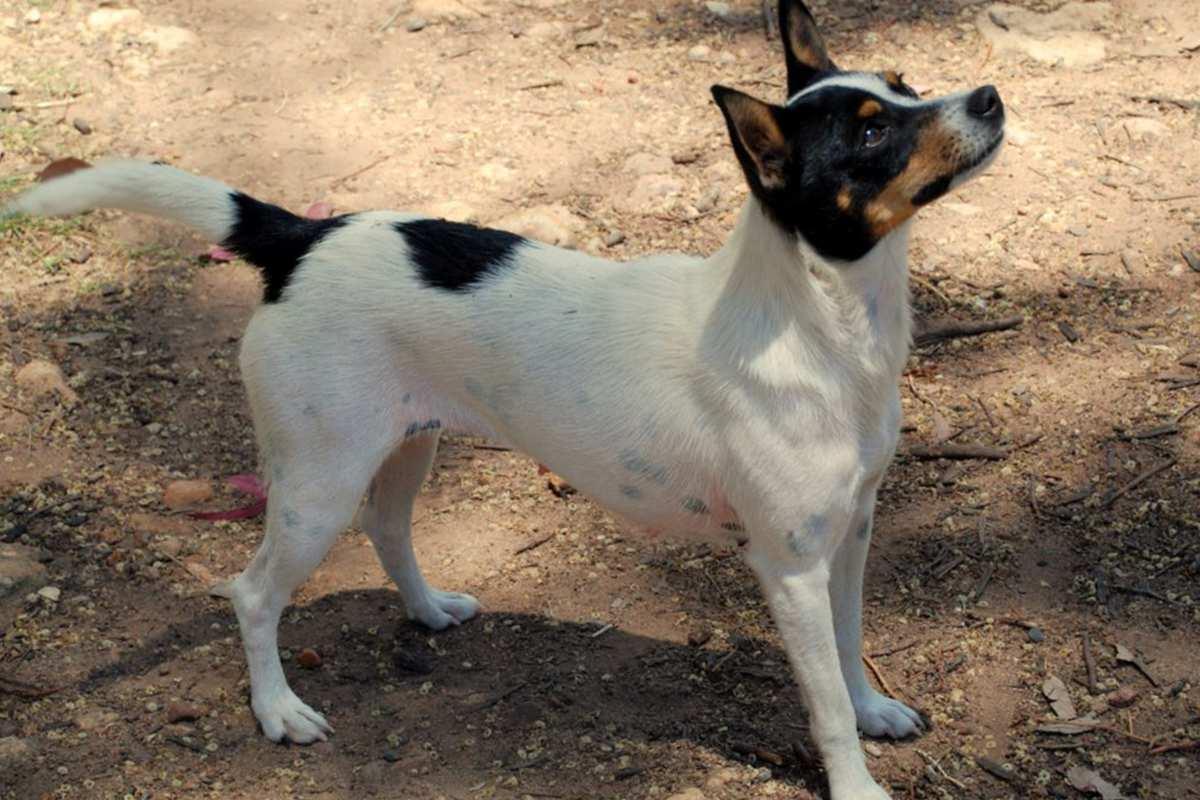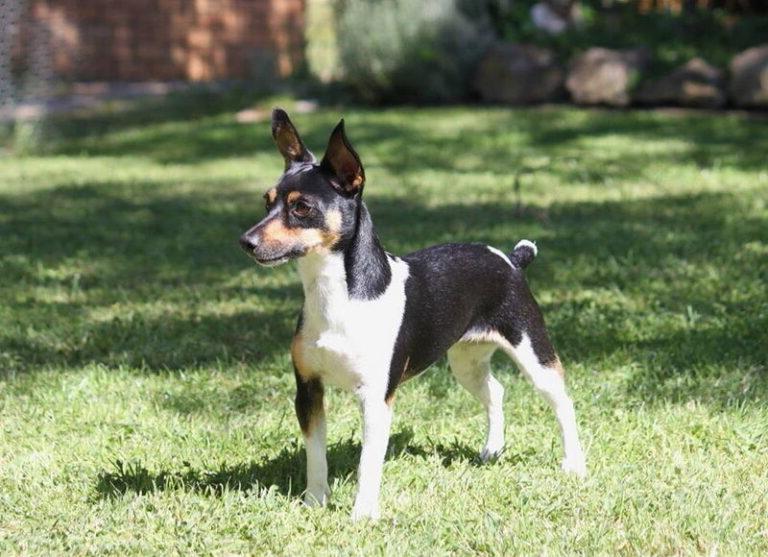- Breed Category: Terrier
- Country of Origin: Australia
- Average Height: 24-30 cm (9.5-12 inches)
- Average Weight: 3.5-5.5 kg (7.7-12 lbs)
- Average Life Span: 12-15 years
- Grooming Requirements: Low, occasional brushing
- Exercise Requirements: Moderate, daily walks
- Coat Type: Short, smooth
- Coat Color Variations: Black, white, tan
- Shedding Level: Low
- Ear Type: Erect
- Tail Type: Straight, often docked
- Temperament: Lively, alert, friendly
- Intelligence Level: High
- Barking Tendency: Moderate
- Compatibility with Children: Good with supervision
- Compatibility with Other Pets: Generally good
- Training Ease: Relatively easy
- Common Health Issues: Patellar luxation, allergies
- Dietary Needs: High-quality, balanced diet
- Energy Level: High
- Drooling Tendency: Low
- Sensitivity to Weather: Sensitive to cold
- Overall Maintenance Level: Low
- Original Purpose: Vermin control, hunting
- Apartment Friendly: Yes, with sufficient exercise
- Best Suited For: Active families, singles
- Cost of Ownership: Moderate
- Unique Traits: Agile, excellent hunters
Ever found yourself wondering if a small dog can keep up with your active lifestyle? Enter the Miniature Fox Terrier. This little dynamo is known for its boundless energy and keen intelligence, making it a perfect companion for those who love a bit of adventure. Originating in Australia, the Miniature Fox Terrier has a rich history as a working dog, prized for its agility and hunting prowess. Despite its small size, this breed is packed with personality and charm.
In this article, we’ll dive into the unique characteristics that set the Miniature Fox Terrier apart, explore its fascinating history, and provide insights into how best to care for this spirited breed. Whether you’re a seasoned dog owner or a first-timer, there’s plenty to learn about this delightful canine.
History and Origin of the Miniature Fox Terrier

Early Development of the Breed
The Miniature Fox Terrier, affectionately known as the “Mini Foxie,” has its roots firmly planted in Australia. This breed emerged in the early 20th century, a result of crossing smaller Fox Terriers with other small breeds like the Manchester Terrier and Whippet. The goal was to create a compact, agile dog that retained the hunting instincts and tenacity of its larger relatives. Over time, the Mini Foxie developed its own distinct characteristics, becoming a beloved breed in its own right.
Role in Australian Hunting and Farming
In the rugged Australian landscape, the Miniature Fox Terrier quickly proved its worth. Farmers and hunters alike valued these dogs for their ability to control vermin and assist in hunting small game. Their keen senses and quick reflexes made them indispensable on farms, where they helped protect crops and livestock from pests. Despite their small stature, Mini Foxies were known for their courage and determination, often taking on challenges much larger than themselves.
Key Historical Figures Involved in the Breed’s Creation
While the exact individuals responsible for the breed’s creation remain somewhat obscure, it is clear that Australian farmers and breeders played a pivotal role. These early enthusiasts were driven by a need for a versatile, hardworking dog that could thrive in the diverse Australian environment. Their efforts laid the foundation for the Miniature Fox Terrier we know and love today, a testament to their vision and dedication.
Physical Characteristics of the Miniature Fox Terrier

Appearance
The Miniature Fox Terrier is a small yet striking dog, typically weighing between 3.5 to 5.5 kilograms and standing about 24 to 30 centimetres tall. Its coat is short and smooth, making it easy to maintain. The most common coat colours are black, tan, and white, often with distinctive markings that give each dog a unique look. These markings can vary, but they usually include a combination of patches and spots that add to the breed’s charm.
Unique Physical Traits
One of the standout features of the Miniature Fox Terrier is its agile and compact build. This breed is designed for speed and agility, with a lean body that allows it to move quickly and efficiently. Its ears are typically erect, giving it an alert and attentive expression. The Mini Foxie’s tail is often docked, adding to its sleek appearance. Despite its small size, this dog is robust and full of energy, always ready for the next adventure.
Temperament and Behaviour of the Miniature Fox Terrier

Typical Personality Traits
The Miniature Fox Terrier is a bundle of loyalty and intelligence. Known for its sharp mind, this breed is quick to learn and eager to please. Its high energy level means it’s always up for a game or a brisk walk, making it a great match for active families. Despite its small size, the Mini Foxie is fearless and confident, often displaying a big-dog attitude.
Suitability as a Family Pet and Working Dog
As a family pet, the Miniature Fox Terrier is a delight. Its affectionate nature and playful spirit make it a hit with both adults and kids. This breed thrives in a loving home where it can be part of the action. Additionally, its working dog roots mean it excels in tasks that require agility and quick thinking, making it a versatile companion for those who enjoy dog sports or need a small, efficient helper.
Interaction with Children and Other Animals
Mini Foxies are generally good with children, especially when socialised from a young age. Their playful nature aligns well with kids’ energy, though supervision is always recommended to ensure gentle play. When it comes to other animals, early socialisation is key. While they can coexist peacefully with other pets, their hunting instincts might kick in around smaller animals, so introductions should be managed carefully.
Training and Exercise Needs of the Miniature Fox Terrier

Importance of Early Training and Socialisation
Getting your Miniature Fox Terrier started with training and socialisation early on is crucial. These little dogs are smart and curious, so introducing them to different environments, people, and other animals helps them grow into well-rounded adults. Early socialisation can prevent behavioural issues and ensure they’re comfortable in various situations.
Recommended Training Techniques
When it comes to training, positive reinforcement is the way to go. Mini Foxies respond well to treats, praise, and play as rewards. Keep training sessions short and fun to hold their attention. Consistency is key, so make sure everyone in the household is on the same page with commands and rules.
Daily Exercise Requirements and Activities They Enjoy
These energetic dogs need daily exercise to keep them happy and healthy. A couple of brisk walks, combined with some playtime in the backyard, usually does the trick. They love activities that challenge their minds and bodies, like agility courses or interactive toys. Keeping them engaged helps prevent boredom and the mischief that can come with it.
Health and Lifespan of the Miniature Fox Terrier

Common Health Issues
Miniature Fox Terriers are generally healthy, but like all breeds, they can be prone to certain health issues. Some common concerns include patellar luxation, a condition where the kneecap dislocates, and Legg-Calvé-Perthes disease, which affects the hip joint. Regular vet check-ups can help catch these issues early.
Average Lifespan and Health Tips
With proper care, a Miniature Fox Terrier can live between 12 to 15 years. To keep them healthy, ensure they have a balanced diet, regular exercise, and mental stimulation. These dogs thrive on activity, so keeping them engaged is key to their well-being.
Preventative Care Recommendations
- Regular vet visits for vaccinations and health screenings.
- Maintain a healthy weight through a balanced diet and exercise.
- Dental care is crucial; brush their teeth regularly to prevent dental disease.
- Keep their coat clean and check for any skin issues.
By following these guidelines, you can help ensure your Mini Foxie leads a long, healthy life.
Grooming and Maintenance of the Miniature Fox Terrier
Coat Care and Grooming Routines
The Miniature Fox Terrier’s short, smooth coat is a breeze to maintain. A quick brush once a week is usually enough to keep it looking sleek and shiny. This routine helps remove loose hairs and keeps their skin healthy. Regular grooming sessions also provide a great opportunity to check for any skin issues or parasites.
Shedding and Seasonal Grooming Tips
While Mini Foxies are not heavy shedders, they do experience some seasonal shedding. During these times, you might want to increase brushing to a couple of times a week. This helps manage the extra hair and keeps your home a bit tidier. A gentle bath every few months, or when they get particularly dirty, will keep them smelling fresh without stripping their coat of natural oils.
By sticking to these simple grooming routines, you’ll ensure your Miniature Fox Terrier stays comfortable and looking their best all year round.
Diet and Nutrition for the Miniature Fox Terrier

Nutritional Needs for Optimal Health
Feeding your Miniature Fox Terrier a balanced diet is crucial for their health and vitality. These little dynamos need a diet rich in high-quality proteins, healthy fats, and essential vitamins and minerals. Look for dog foods that list meat as the first ingredient and avoid those with excessive fillers like corn or soy.
Foods to Include and Avoid
Include lean meats, fish, and vegetables in their diet to ensure they get the nutrients they need. Avoid foods high in artificial additives, preservatives, and excessive grains. Treats should be given sparingly and should be healthy options like small pieces of cooked chicken or carrot sticks.
Feeding Schedules and Portion Recommendations
Stick to a regular feeding schedule to maintain their energy levels and prevent overeating. Typically, two meals a day are sufficient for adult Mini Foxies, while puppies may need three smaller meals. Portion sizes depend on their age, weight, and activity level, so consult your vet for personalised advice. Remember, keeping them at a healthy weight is key to their overall well-being.
Fun Facts and Trivia about the Miniature Fox Terrier
Interesting Tidbits about the Breed
Did you know that the Miniature Fox Terrier is sometimes called the “Mini Foxie”? This nickname reflects its playful and spirited nature. Despite its small size, this breed has a big heart and an even bigger personality. Known for its agility, the Mini Foxie can often be seen zipping around with impressive speed, making it a favourite in agility competitions.
Another fun fact is that these dogs have a natural instinct for hunting and vermin control, a trait that has been passed down from their ancestors. This makes them not only great companions but also excellent little helpers around the farm or garden.
Famous Miniature Fox Terriers in Media or History
While the Miniature Fox Terrier may not have the same level of fame as some other breeds, it has made its mark in Australian culture. These dogs have been featured in various local advertisements and TV shows, often showcasing their lively and endearing nature. Their intelligence and trainability make them a popular choice for roles that require a bit of canine charisma.
Final Thoughts
The Miniature Fox Terrier is a small dog with a big personality. This breed’s lively nature and intelligence make it an ideal companion for active individuals and families. With its rich history and unique traits, the Mini Foxie offers both challenges and rewards, from its energetic demands to its affectionate companionship. Embracing this breed means welcoming a spirited, agile friend into your life, ready for adventure and love. Consider adopting a Miniature Fox Terrier to experience the joy and excitement they bring to any home.
